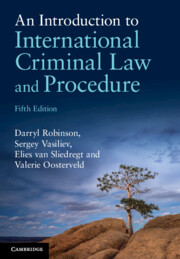Book contents
- An Introduction to International Criminal Law and Procedure
- Reviews
- An Introduction to International Criminal Law and Procedure
- Copyright page
- Dedication
- Brief Contents
- Contents
- Preface to the Fifth Edition
- Table of International Cases
- Table of National Cases
- Abbreviations
- Abbreviations of Book Titles
- Part I Introduction
- Part II Prosecutions in National Courts
- Part III International Prosecution
- Part IV Substantive Law of International Crimes
- Part V International Criminal Procedure and Sentencing
- 17 International Criminal Procedure
- 18 Victims in International Criminal Justice
- 19 Punishment and Sentencing
- Part VI Relationship between National and International Systems
- Index
- References
17 - International Criminal Procedure
from Part V - International Criminal Procedure and Sentencing
Published online by Cambridge University Press: 07 November 2024
- An Introduction to International Criminal Law and Procedure
- Reviews
- An Introduction to International Criminal Law and Procedure
- Copyright page
- Dedication
- Brief Contents
- Contents
- Preface to the Fifth Edition
- Table of International Cases
- Table of National Cases
- Abbreviations
- Abbreviations of Book Titles
- Part I Introduction
- Part II Prosecutions in National Courts
- Part III International Prosecution
- Part IV Substantive Law of International Crimes
- Part V International Criminal Procedure and Sentencing
- 17 International Criminal Procedure
- 18 Victims in International Criminal Justice
- 19 Punishment and Sentencing
- Part VI Relationship between National and International Systems
- Index
- References
Summary
The chapter presents an overview of the procedural arrangements adopted at the international criminal jurisdictions, namely the UN ad hoc tribunals for the former Yugoslavia and Rwanda and the International Criminal Court (ICC), covering the main milestones from the initiation of the investigation to trial phase to appeals against the judgment and sentence and review. Before delving into the trajectories of an criminal case before international criminal courts and tribunals, the chapter highlights the origins of international criminal procedure in the common law (Anglo-American, or ‘adversarial’) and civil law (Continental, or ‘inquisitorial’) approaches, resulting in its legal nature as a hybrid scheme where the balance between the domestic influences varies by tribunal and over time due to reforms pursued by judge-legislators (ICTY and ICTR) or by states and, to a lesser extent, judges (ICC). The chapter reviews the role and functions of the main actors in international criminal proceedings, including repeat or professional players (judges, prosecutors, and defence) and other participants such as victims and witnesses and states and international organisations. It also highlights the normative importance of human rights to international criminal process and the imperative of complying with the principles of public, fair and expeditious proceedings.
Keywords
- Type
- Chapter
- Information
- An Introduction to International Criminal Law and Procedure , pp. 387 - 425Publisher: Cambridge University PressPrint publication year: 2024

